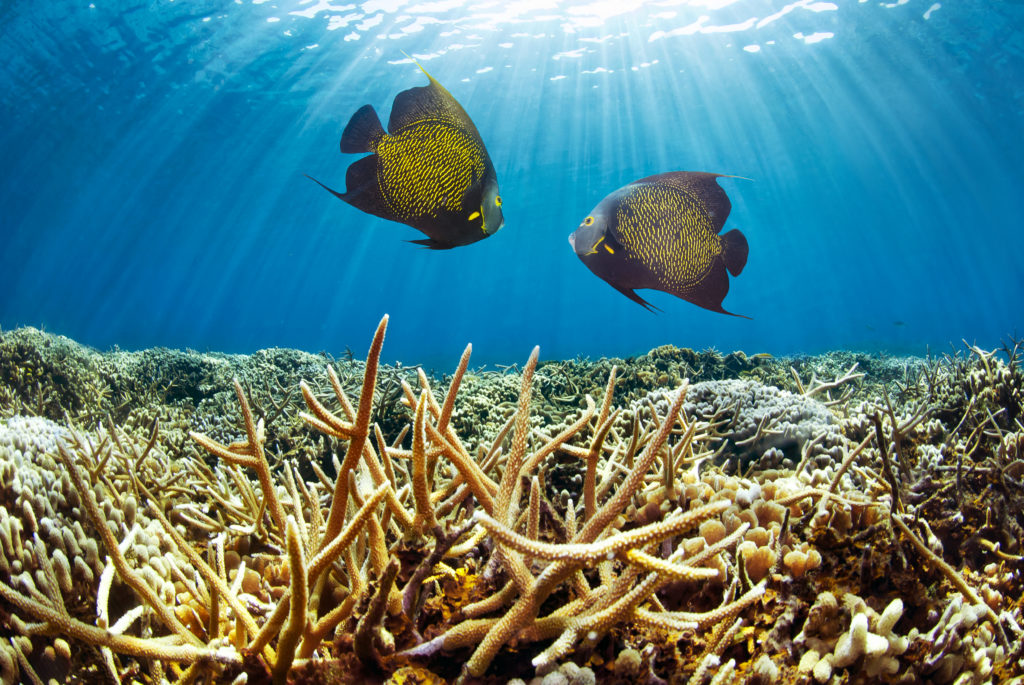Anthropocene
Anthropocene is the term used to refer to the current time in geology in which humans have had a dominating influence on the climate and the environment. The big question we look at during this time is how ecology is affected. More specifically today we ask the question whether coral reefs can survive during this time and what their future looks like.
Can They Survive?
It is known that coral reefs have underwent rapid degeneration over the years from both humans and climate change. According to Edwards eat al. (2024), coral reef ecosystems will continue to decline unless greenhouse gases are reduced and strategies are put into place to assist with adaptation. In addition, Jury et al. (2024) supports these claims stating that if climate change is limited to Paris Climate Agreement targets, coral reefs do have the chance of surviving. Coral reefs can survive in the Anthropocene, but what does this future look like under these claims?
How do They Survive?
It starts with being realistic about where society is at and how to go about helping. Stated by Quigley et al. (2022), not all areas can and should be restored. Quigley goes on to state in the article that focuses should be directed towards protecting existing reefs, using resilient coral species, and boosting biodiversity. There is no time to wait. Acting promptly and intentionally is key for coral reef survival. Bowden-Kerby (2022) claims that in the next 25 years the time for action and persistent effort is closing and by 2050, it will be too late. The time to start was long before, but we can still see a future with coral reefs if we act accordingly. Charo, B (2023) explains that through simulation they have found the two 2 key takeaways to help ensure survival include, genetic variability among coral reefs and the urgency to reduce human emissions. Complementary to this, Paxton et al. (2024) explains how dialogue with affected communities is needed to help imagine the building of ecosystem resilience.
Ready, Set, Go!
Coral reefs can be part of our future for years to come, but it all starts with the amount of time and effort we put in starting now. “How you do anything is how you do everything” -unknown.
References:
Bowden-Kerby, A. (2022). “Coral-focused climate change adaptation and restoration based on accelerating natural processes: Launching the ‘Reefs of hope’ paradigm.” Oceans, 4(1), 13–26.
Charo, B. (2023). “Coral reefs can adapt to climate change – here’s how .” Coral Reef Alliance, <https://coral.org/en/blog/coral-reefs-can-adapt-to-climate-change-heres-how/> (Aug. 3, 2025).
Edwards, A., Guest, J., and Humanes, A. (2024). “Rehabilitating coral reefs in the anthropocene.” Current Biology, 34(9).
Jury, C. P., Bahr, K. D., Cros, A., Dobson, K. L., Freel, E. B., Graham, A. T., McLachlan, R. H., Nelson, C. E., Price, J. T., Rocha de Souza, M., Shizuru, L., Smith, C. M., Sparagon, W. J., Squair, C. A., Timmers, M. A., Vicente, J., Webb, M. K., Yamase, N. H., Grottoli, A. G., and Toonen, R. J. (2024). “Experimental coral reef communities transform yet persist under mitigated future ocean warming and acidification.” Proceedings of the National Academy of Sciences, 121(45).
Paxton, G., Lockie, S., and Backhaus, V. (2024). “Articulating futures: Community storylines and assisted ecosystem adaptation in the Great Barrier Reef.” Environmental Science & Policy, 162, 103944.
Quigley, K. M., Hein, M., and Suggett, D. J. (2022). “Translating the 10 golden rules of reforestation for Coral Reef Restoration.” Conservation Biology, 36(4).

